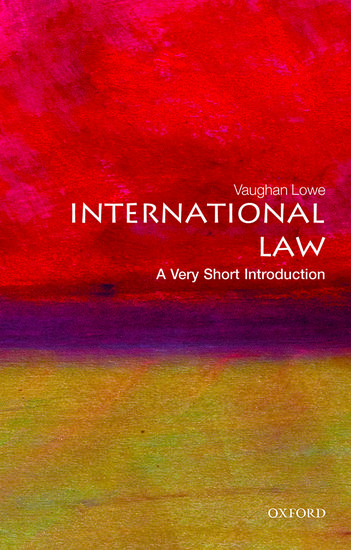A Very Short Introduction | Law
International Law
ISBN: 9780199239337
Series: A Very Short Introduction
International Law (Law)
A Very Short Introduction International Law (Law) Media > Books > Non-Fiction > Education Books Now Available| Order Below |
ISBN
9780199239337 (10-digit ISBN: 0199239339)
- Description
- Key Features
- Series Description
- Table of Contents
- Considers what international law is and what it can and can't do, in order to dispel some of the myths surrounding its capabilities
- Explores the role of law in international society and considers what jurisdiction international law should have
- Concentrates on specific and relevant international concerns, such as the environment, terrorism, international violence, cultural differences, and poverty
- Examines the conflict between the principles and the goals of international law - and how they can be resolved
Interest in international law has increased greatly over the past decade, largely because of its central place in discussions such as the Iraq War and Guantanamo, the World Trade Organisation, the anti-capitalist movement, the Kyoto Convention on climate change, and the apparent failure of the international system to deal with the situations in Palestine and Darfur, and the plights of refugees and illegal immigrants around the world. This Very Short Introduction explains what international law is, what its role in international society is, and how it operates. Vaughan Lowe examines what international law can and cannot do and what it is and what it isn't doing to make the world a better place. Focussing on the problems the world faces, Lowe uses terrorism, environmental change, poverty, and international violence to demonstrate the theories and practice of international law, and how the principles can be used for international co-operation.
Oxford's Very Short Introductions series offers concise and original introductions to a wide range of subjects--from Islam to Sociology, Politics to Classics, Literary Theory to History, and Archaeology to the Bible.
Not simply a textbook of definitions, each volume in this series provides trenchant and provocative--yet always balanced and complete--discussions of the central issues in a given discipline or field. Every Very Short Introduction gives a readable evolution of the subject in question, demonstrating how the subject has developed and how it has influenced society. Eventually, the series will encompass every major academic discipline, offering all students an accessible and abundant reference library.
Whatever the area of study that one deems important or appealing, whatever the topic that fascinates the general reader, the Very Short Introductions series has a handy and affordable guide that will likely prove indispensable.
Please note: As this series is not ELT material, these titles are not subject to discount.
Preface
1: Nations Under Law
2: Where does international law come from?
3: Freedom from external interference
4: Sovereignty inside the State
5: What international law does well
6: What international law does badly (or not at all)
References
Further Reading
Index
Interest in international law has increased greatly over the past decade, largely because of its central place in discussions such as the Iraq War and Guantanamo, the World Trade Organisation, the anti-capitalist movement, the Kyoto Convention on climate change, and the apparent failure of the international system to deal with the situations in Palestine and Darfur, and the plights of refugees and illegal immigrants around the world. This Very Short Introduction explains what international law is, what its role in international society is, and how it operates. Vaughan Lowe examines what international law can and cannot do and what it is and what it isn't doing to make the world a better place. Focussing on the problems the world faces, Lowe uses terrorism, environmental change, poverty, and international violence to demonstrate the theories and practice of international law, and how the principles can be used for international co-operation.
Key Features
- Considers what international law is and what it can and can't do, in order to dispel some of the myths surrounding its capabilities
- Explores the role of law in international society and considers what jurisdiction international law should have
- Concentrates on specific and relevant international concerns, such as the environment, terrorism, international violence, cultural differences, and poverty
- Examines the conflict between the principles and the goals of international law - and how they can be resolved
Series Description
Oxford's Very Short Introductions series offers concise and original introductions to a wide range of subjects--from Islam to Sociology, Politics to Classics, Literary Theory to History, and Archaeology to the Bible.
Not simply a textbook of definitions, each volume in this series provides trenchant and provocative--yet always balanced and complete--discussions of the central issues in a given discipline or field. Every Very Short Introduction gives a readable evolution of the subject in question, demonstrating how the subject has developed and how it has influenced society. Eventually, the series will encompass every major academic discipline, offering all students an accessible and abundant reference library.
Whatever the area of study that one deems important or appealing, whatever the topic that fascinates the general reader, the Very Short Introductions series has a handy and affordable guide that will likely prove indispensable.
Please note: As this series is not ELT material, these titles are not subject to discount.
EASY ORDER FORM
PRICES LISTED INCLUDE CONSUMPTION TAX
Price Before Tax:
¥1,790


